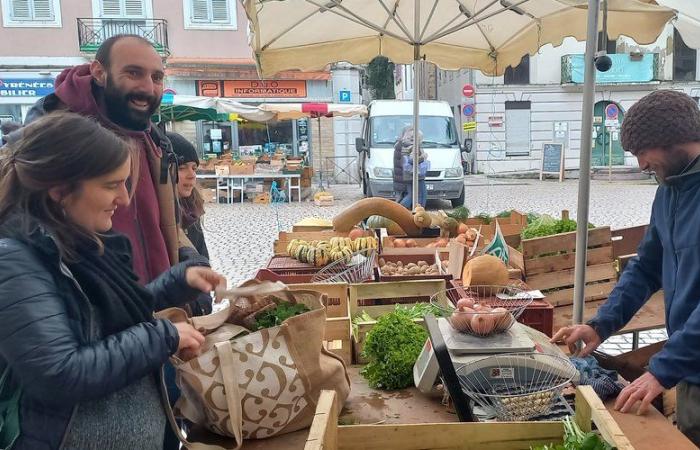
the essential
The Foix market is full of local producers. Even if they sell their products directly, they are also affected by the agricultural crisis. Four of them talk about their difficulties.
On the Foix market, the “small producers”, as we tend to call them, are not spared from the agricultural crisis. Although they sell their goods directly, they are faced with rising prices on a daily basis.
Shrinking margins
On his small stand, Anthony Marque has easy familiarity with his customers. He created his market gardening operation O jardin de Rougé, in Esplas-de-Sérou, five years ago. And since then, its margin has only declined. “What hurts small producers the most is inflation. Everything has increased, small supplies, the price of plants, plus 25%. Fortunately, I don't use too much fuel.”
Increases that he avoids passing on to the prices of his vegetables. “I'm at €3.50 per kilo of onions. I can't do more. We do hard work, and all these increases are difficult.” He hopes to last a long time, and is happy to “get €700 out of my salary per month, for 200 hours of work per month”, knowing that he receives €1,500 per year in bonuses from the Common Agricultural Policy.
He can count on the support of certain stores which buy directly from producers. “Certain brands, like the Biocoop of Saint-Girons, play the game by using local supplies, even if a cauliflower from Brittany costs half as much as Ariégeois,” notes Anthony Marque.
As for the standards in question, this does not bother the farmer. On the contrary, “the more there are, the more I find the better. I have an organic label, which is becoming more and more permissive. We were authorized to heat the greenhouses this year!”
“We are creating precariousness”
Hadrien Maltot is also affected by increases in the price of raw materials, but even more so by the cost of payroll. And this worries him for the future of his farm, located in Saint-Jean-du-Falga. “The minimum wage has increased three times. It's very good for employees, I'm not saying the opposite, but payroll costs represent 40% of turnover. We must stop taxing employment,” he laments. -he.
For the moment, it employs four to five full-time equivalent people. He raised his prices, but “not proportionally to inflation” so as not to cause his prices to skyrocket.
To remain viable, he is considering extensive mechanization. It would reduce its payroll, which would make operations lose all meaning. “I can invest €10,000 in a machine, but then I only have two employees left per year. I have already thought about it, and I create precariousness. Either, we make money with machines, we quadruple your salary or, we do direct sales and we hire four or five people.
Hadrien Maltot would like part of the hours to be tax-exempt or subsidized, from five hires for example. He admits: “I don’t expect anything from politicians.” He insists on working with school canteens. “The chefs try to play the game. But I understand that they buy zucchini from Perpignan, where the weather is good, at €0.90 per kg, when we are at €1.40.”
“The farmers wanted this situation indirectly”
At the Gaec Les Petites Merveilles, in Saverdun, the poultry operator complains about the paperwork: “I spend more time doing the paperwork than anything else”. She also denounces the multitude of checks she undergoes. “We are always being watched!”, she protests. It only increases its prices once a year. Customers remain loyal, “direct selling is the only thing that works”.
The Gaec La Ferme de l'Escalière, in Lherm, which produces goat's cheese, is doing well due to its quasi-autonomy. “We produce 75% of the animal feed. We sell directly to control costs and profitability,” comments Nicolas Mozin.
The manager increased his prices to compensate for the increase in electricity and fuel prices. “We explained it to customers, they understand it because they are experiencing the same problems. It is certain that we do not depend on cooperatives. The situation is very hard for the farmers who work with them.”
Market traders' recriminations reflect national concerns, but to a lesser extent. One of them puts forward his theory to explain the agricultural malaise, but he preferred to remain anonymous: “15 or 20 years ago, agriculture returned to liberal capitalism, the farmers wanted this situation indirectly The FNSEA advocated free trade, specialization, big farms We see today that this is no longer viable. Practices far removed from the Fuxé market, which has successfully chosen proximity.





